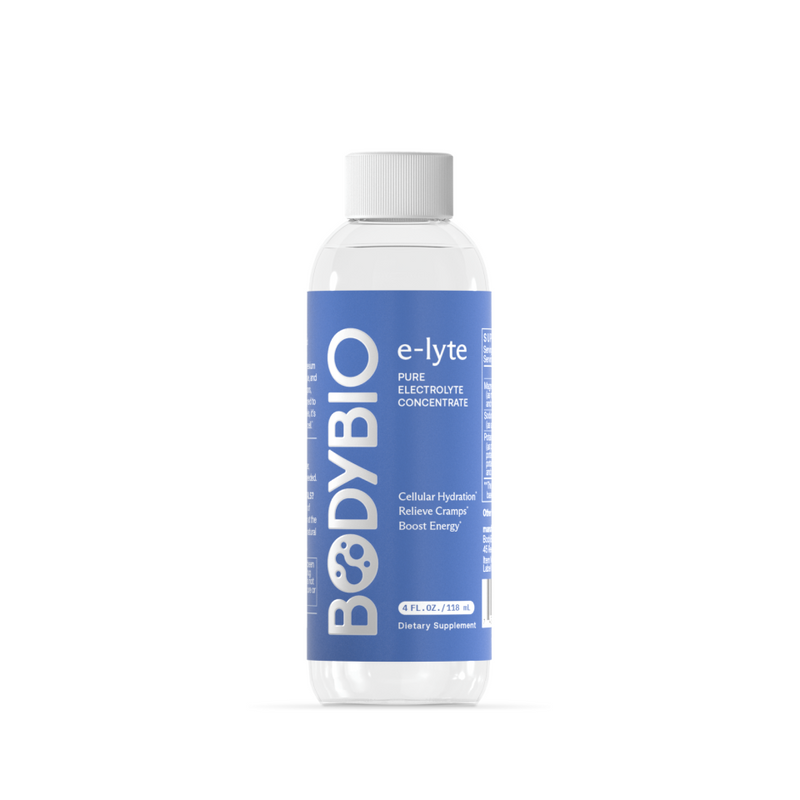Water & Gut Health: Does Drinking Water Really Help Digestion?
Authors:

Dr. Thomas Wnorowski
PhD, CNCC Research Director, BodyBio & Biomedical Nutritionist
Key Takeaways:
Key Points:
- Proper hydration is extremely important for gut health — especially if you experience frequent constipation. Water acts as a lubricant to get things moving and support healthy bowel movements.
- Drinking adequate water is only one small part of hydration. It’s equally important to include minerals and electrolytes — both in your drinking water and diet.
- Water processing and local water quality can greatly impact hydration and gut health. Make sure you filter your water source and add minerals back into any filtered water.
Up to 60 percent of the body is made up of water.
To state the obvious, water is essential for life.
But we don’t always realize — it’s also essential for digestion.
Actually, water can have similar effects to fiber when it comes to digestive relief.
It helps get things moving in the digestive tract — lowering the risk of constipation and its many uncomfortable side effects.
Let’s explore how the simple life hack of hydration can help mitigate daily gut symptoms and improve your gut health.
Table of Contents:
- Does Water Speed Up Digestion?
- FAQs and Best Hydration Practices
- The Best Time to Drink Water
- Enhance Hydration with High-Quality Electrolytes
Does Water Speed Up Digestion?
Absolutely. Water acts as a lubricant, helping to move food along the digestive tract smoothly. Since much of the body is made of water, many digestive functions rely on water for optimal performance. For instance, saliva and stomach acid both contain some water.
While constipation is often blamed on a lack of fiber or more complex digestive issues, it’s sometimes just the result of dehydration. Simply put, there isn’t enough water to get things moving through the stomach and intestines.
Frequently Asked Questions and Best Hydration Practices for Gut and Cell Health
Now that we understand the importance of water as it relates to gut health, let’s dig deeper.
- Not all water is the same — especially in the modern world. Some water is contaminated with heavy metals or bacteria (less common) and some with chlorine, fluoride, or microplastics (more common).
- Most modern water sources are stripped of essential minerals, leaving little nutritional value, thereby increasing the risk of dehydration.
So how can we get our drinking water closer to the pure source of electrolytes and trace minerals that Mother Nature intended? These best practices and frequently asked questions for hydration can help you optimize the water you drink.
Add Mineralized Salt to Your Water for Cellular Support
One of the best ways to stay hydrated is to pay attention to the minerals in your water supply. Since modern tap water is highly processed and filtered, essential minerals like calcium and magnesium are almost completely eliminated.
Water processing does come with benefits — but it’s important to understand that we lose essential nutrients when heavy filtration comes into play. One interesting study found that diets high in calcium and magnesium couldn’t make up for the lack of those nutrients in demineralized water.
Luckily, it’s easy to add minerals back into filtered water. You can add a pinch of sea salt (i.e., Celtic Sea Salt or Redmond’s Salt), use liquid mineral drops a few times daily, or for deeper hydration support, an electrolyte concentrate is an excellent option.
Does Lemon Water Help with Digestion?
Yes. We recommend adding fresh lemon to your water every morning. Drink it first thing — before your morning coffee. Not only does this practice add minerals and vitamins to your diet, it can also enhance hydration, boost stomach acid before you eat your first meal of the day, and support liver function.
Of course, you can also consider adding a pinch of mineralized salt for an extra hydration boost and/or ginger to soothe the stomach lining and gut.
Does Carbonated Water Help with Digestion?
Carbonated beverages should be consumed with caution — since studies associate them with an increased risk of Gastroesophageal Reflux Disease (GERD). However, if you don’t commonly experience acid reflux, healthy carbonated beverages like sparkling mineral water could keep your digestive system hydrated and moving. They introduce bubbles into your stomach, which can be helpful for relieving constipation.
Does Drinking Hot Water Help with Digestion?
Absolutely. If cold water isn’t helping to promote a bowel movement, it may be time to try hot (or warm) water. This simple hack can soothe the digestive system while improving circulation and gently stimulating the gut.
In the ancient Indian medicine of Ayurveda, warm water is supposed to penetrate deeper into the body and help improve nutrient absorption. There’s no scientific evidence for this theory, but there’s no harm in experimenting with it for yourself. Again, you could add lemon and/or ginger for flavor and an extra digestive boost.
Is Cold Water Bad for Digestion?
Not necessarily. Although cold water can restrict blood vessels and cause you to burn a few more calories, this shouldn’t have much impact on digestion. If you notice a major difference between how you feel drinking cold water versus warm water, that may be a sign of a deeper digestive issue.
Can Tap Water Impact Gut Health?
Yes, drinking tap water can impact gut health. Microplastics, chlorine, fluoride, and even remnants of pharmaceutical drugs have all been found in tap water. High levels of these contaminants may cause digestive distress over time, especially if you drink tap water often.
This is why it’s essential to use an adequate water filter — and to stay informed about your local water supply. We recommend checking out the Environmental Working Group’s Tap Water Database to get a full picture of any known water contaminants in your area.
Best Time to Drink Water for Digestion: Before, During, or After a Meal?
To optimally support gut health, it may help to drink a glass of water before your meal (around 20-30 minutes). That said, if you’re chronically dehydrated, there’s not really a “best time” to drink water. Drink mineralized water often until you start to feel better.
Don’t Drink Too Much Water
For a while, drinking tons of water was a popular health trend. Maybe you’re familiar with challenges like 75 Hard, which encourages drinking a gallon of water daily. Or, you’ve been told that sometimes hunger presents itself as thirst.
Either way, drinking too much water could actually dehydrate your body — especially if that water is void of minerals and electrolytes. Drinking demineralized water can flush out much-needed electrolytes and promote fluid imbalance.
Instead of drinking as much water as possible, we encourage you to be mindful of minerals and listen to your body’s thirst cues. For most people, the recommended 6-8 cups of water per day (with added electrolytes and trace minerals) is sufficient.
Enhance Hydration with High-Quality Electrolytes
We simply cannot talk about water and gut health without mentioning electrolytes.
These essential minerals are vital to fluid balance and real hydration. They energize us and allow our bodies to retain water, carefully fighting off fluid loss from the cell.
But as vital as electrolytes are to our bodies, not all of them are the same.
The most popular electrolyte drinks are filled with sugar, processed ingredients, food dye, and even high levels of caffeine. All ingredients that can make gut symptoms flare up, and ironically, require even more hydration to process in the body.
That’s why we created our signature electrolyte supplement, E-Lyte. The goal of E-Lyte is to hydrate even the most health-conscious individuals — with a simple mineral concentrate. There are no dyes, artificial sweeteners, or sugars. Just pure electrolytes for your cells.
Heidarzadeh-Esfahani, N., Soleimani, D., Hajiahmadi, S., Moradi, S., Heidarzadeh, N., & Nachvak, S. M. (2021). Dietary Intake in Relation to the Risk of Reflux Disease: A Systematic Review. Preventive nutrition and food science, 26(4), 367–379. https://doi.org/10.3746/pnf.2021.26.4.367
Markland, A. D., Palsson, O., Goode, P. S., Burgio, K. L., Busby-Whitehead, J., & Whitehead, W. E. (2013). Association of low dietary intake of fiber and liquids with constipation: evidence from the National Health and Nutrition Examination Survey. The American journal of gastroenterology, 108(5), 796–803. https://doi.org/10.1038/ajg.2013.73
Verma, K. C., & Kushwaha, A. S. (2014). Demineralization of drinking water: Is it prudent?. Medical journal, Armed Forces India, 70(4), 377–379. https://doi.org/10.1016/j.mjafi.2013.11.011

